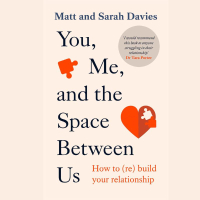How to spice up your relationship - 10 expert tips to improve intimacy when you've been together a long time
Feel like you need to learn how to spice up your relationship? Married therapists Sarah and Matt Davies share what they’ve learnt about keeping the spark alive


Looking to learn how to spice up your relationship? After years with the same person, a relationship can feel a bit like your favourite jumper – familiar and comfy but a little dull and frayed around the edges. Wish you could get back some of the excitement and feel closer to your partner again? Meet Sarah, an embodiment coach, and Matt Davies, a psychotherapist and psychosexual therapist, who are happily married and have known each other for 25 years.
Based on personal and professional experience of a variety of relationships, they have co-authored a book about the secrets of lasting love and how to revive romance in a relationship. "Research around couples who think they’ve found 'The One' shows they are often more complacent and believe they are automatically going to stay together," explains Sarah Davies. "This means they don’t make as much effort to look after their relationship and nurture it."
There are bound to be "niggles and disappointments", adds Matt Davies, but you have to work together to solve them. Here, Sarah and Matt reveal how to spice up your relationship with an MOT, designed to iron out the issues and reignite the spark.
How to spice up your relationship
1. Treat your partner like a stranger
One of the traps long-term couples fall into is thinking they know everything about one another, but you’re not the same person you were when you first got married – you’re going to develop and change.
Predicting the other person’s reaction stifles healthy dialogue and discussion. Instead of assuming, get curious and ask what's important to them now. Learning new things about each other adds interest to the relationship.
For example, one woman&home writer took on the challenge of using an intimacy app called Paired to better understand her partner of 12 years.
Sarah Davies is a founding member of Open Floor International (OFI), an organisation in the foreground of somatic education and mindful movement. She is also a member of International Conscious Movement Teachers Association (ICMTA), a worldwide network of qualified conscious movement teachers who offer movement practice as a path to freedom, connection, creativity and wholeness
2. Accept that your sex life will change
We often have this idea that like the sexual fireworks at the start of the relationship, sex always has to be raunchy and high-octane. Sometimes it still might be, but it’s OK to accept that sex changes over time. It's also OK to accept that sex isn't important in every relationship.
Sign up for the woman&home newsletter
Sign up to our free daily email for the latest royal and entertainment news, interesting opinion, expert advice on styling and beauty trends, and no-nonsense guides to the health and wellness questions you want answered.
It might also change to become more meditative or gentler and it may not always include penetration. "There’s this expectation that you need to have spontaneous desire to be ready for sex, but what we teach people is that there’s also responsive desire," explains Sarah. "This is about being willing, rather than wanting sex, being in a situation that’s lovely and sensual, and seeing what emerges from it."
3. Admit you dislike each other sometimes
The truth is, we all have negative feelings about our partner at times and dislike some of their habits or attitudes. It's one of the most common relationship issues around. "I can get dogmatic and inflexible, and that can really grate on Sarah," says Matt. "So we have this exercise in the book where you take turns to say what you’re actually feeling and don’t want to express. You might say, 'I hate that part of you that’s slow to respond when I ask you to do something.'"
Sarah adds, "That’s useful information that the other person can think about and work on. The dangerous part of a relationship is indifference."
You, Me, and the Space Between Us: How To (Re) Build Your Relationship by Matt and Sarah Davies - £16.99, PB, Lagom
Matt and Sarah's book covers topics such as boundaries, communication, conflict, resolution, desire, and sense of self, along with the areas included here. Throughout, Matt and Sarah offer expert advice on how to build trust, intimacy and love in a long-term relationship.
4. Make complaints and recommendations
Constant criticism can eat away at even the happiest partnership, so Matt and Sarah limit themselves to three moans a day. Once you’ve aired a gripe, tell your partner what you would prefer them to do.
"Trying to change the other person in your relationship is exhausting and doesn’t work, but you can change your behaviour and adapt and grow together," says Sarah, which in turn can help lighten the mental load you might be experiencing.
"You might say, 'When you leave the wet towels on the bathroom floor, I feel annoyed,' then explain the story you tell yourself about their behaviour," says Matt. "This might be, 'When you do that, I think you don’t care about me.' You need to give a concrete idea of what you’d like them to do differently, such as to hang the towel up next time. Naming the behaviour helps iron out what is bugging you." This can help with the small day-to-day irritations and help you talk about your expectations in a relationship if you haven't discussed them in a while.
Matt is a fully licensed psychotherapist, psychosexual and relationship therapist and marriage counsellor and trained at internationally renowned Tavistock Institute of Medical Psychology.
5. Take a walk
To learn how to spice up your relationship in the long term, you need to make time to talk about the difficult issues that keep causing problems and tripping you up. "We do this by going for a walk because it can help keep you moving both physically and emotionally," says Sarah.
"Sometimes we also switch sides and argue the other person’s point of view. If you don’t acknowledge resentments, they fester and bubble up," says Matt. This in turn can lead to more issues - and even relationship burnout.

6. Mix things up in the bedroom
Looking to learn how to spice things up in the bedroom as well as your day-to-day relationship? Sarah suggests focusing on the three different styles of sexual activity: "Self-focused, partner-focused and role play, and it’s worth trying them all. Role play was the tricky one for us as we both thought, 'Oh God, we don’t want to dress up!' She laughs. ‘But it can be funny and interesting, and take you out of your comfort zone. Of course, you don’t have to dress up. It might be about being more assertive or playful, taking on a different persona, or keeping up a dialogue about what you’re experiencing."
Take a risk, try one of the best sex positions you haven't done in a while, try something different and remember that often, the older we get, the more we’re able to be intimate and vulnerable with one another – and so the better sex can become!
7. Learn to self soothe
Emotional support in a relationship is vital but becoming too dependent on your partner isn’t healthy, especially if you're looking to learn how to spice up your relationship. "You need to learn how to self-soothe when something is triggering and is making you distressed or upset," explains Sarah.
"When we are both feeling emotionally needy, stressed and overwhelmed, we get into what we call our behaviour hamster wheel," she adds. "I take on this bossy mother-figure role and Matt becomes more childlike and dependent. We have had to learn to recognise and unpick what we were doing because this dynamic was so unsatisfying and unsexy."
The act of self-soothing can be as simple as grounding yourself by paying attention to your breath and the feel of the weight of your body on a chair, or your feet on the ground. It can soothe the whole parasympathetic nervous system, giving you the chance to pause for long enough to change your behaviour and how you react to whatever is triggering you. It helps you stay with your discomfort and tolerate your feelings." Need help with engaging in mindfulness? One of the best meditation apps may help.
8. Mirror your partner
We all want to feel we have been heard, and mirroring what your partner has just said can help you do this. "So, if Sarah says that she’s really annoyed I didn’t fill the car up with petrol, I might say, 'I heard you say you’re annoyed that I didn’t fill the car up with petrol – tell me more about that,'" says Matt.
"Mirroring and asking for more information helps me stand back and stops me from becoming defensive. What we all want is validation but often we don’t get it, because the other partner thinks it’s about them and starts trying to defend their position. That can leave your partner feeling unacknowledged and lead to resentment."
9. Show you care
Staying in love and being happy in a relationship means showing you care through your loving actions. A useful way to do this is by each writing a list of three things your partner could do that would lift your day. Simple things like bringing you a cup of tea in the morning, saying ‘I love you’ more often, or arranging a dinner date can help you learn how to spice up your relationship.
"Swap lists and it gives you concrete things to do for your partner that you know they would like, it’s another way of understanding and meeting each other’s needs," says Sarah. "You can also make a list of what you think your partner would like you to do and exchange them to see if you’re projecting what you’d like onto them."

10. Don't expect them to be a mind reader
This is about thinking that your partner is going to automatically know and give you what you need, explains Matt. "So if they loved us enough, they would know we need a hug." But we forget that we haven’t asked.
"It’s easier to blame the other person, rather than allow yourself to be vulnerable because you might not get what you want. Instead of getting angry and defensive, try to explain why you weren’t able to ask for what you needed," he says.
What about therapy? Sarah and Matt first went to couples counselling themselves after the tragic death of one of their twins. They’ve been back numerous times since. "For ongoing bumps and difficulties, it’s helped us recognise patterns in our behaviour and how to get unstuck," says Matt.
Julie Powell is a hugely experienced health and wellness writer and editor. Over the past 30 years, she has worked for national newspapers, BBC radio, expert-led health apps and a range of well-known women's magazines including Simply Woman & Home, Women’s Weekly, Good Housekeeping, Red and Prima. She has written about both physical and emotional wellbeing, covering everything from the power of female friendships and how to give your marriage a midlife makeover to sexual health for grown-ups, perimenopause, positive ageing and breast cancer.
- Grace WalshHealth Channel Editor
-
 These 9 nude Christmas manicures are guaranteed to bring chic festive cheer
These 9 nude Christmas manicures are guaranteed to bring chic festive cheerFor festive but not tacky nail looks, these neutral designs are perfect for celebrating the holidays in (subtle) style...
By Naomi Jamieson Published
-
 What to pack for the ultimate camping experience, no matter the weather
What to pack for the ultimate camping experience, no matter the weatherCamping isn't just about the essentials - it's the small touches of comfort that make the experience one worth repeating. Here's what to bring...
By Grace Walsh Published
